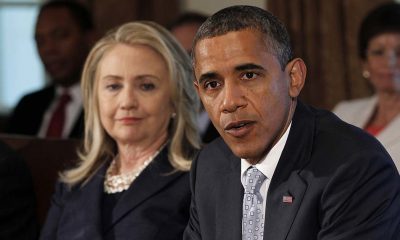World
Jhumpa Lahiri gets National Humanities Medal from Obama

By Arun Kumar
Washington: President Barack Obama presented the 2014 National Medals of Arts and Humanities to Pulitzer Prize winning Indian-American author Jhumpa Lahiri and 20 other distinguished persons at a White House ceremony.
“I always do good with writers and scientists. Those are my crew,” said the president in a grey suit and violet tie as he addressed the audience starting with a quote from Emily Dickinson followed by his own joke on the political class.
“One of our great poets, Emily Dickinson, once said that ‘truth is such a rare thing, it is delightful to tell it.’ The truth is so rare, it is delightful to tell it — and that’s especially true in Washington,” he said amid laughter.
“The men and women that we honour today, recipients of the National Medals for the Arts and the Humanities, are here not only because they’ve shared rare truths, often about their own experience, but because they’ve told rare truths about the common experiences that we have as Americans and as human beings,” Obama said.
“They span mediums and methods. We have artists, actors, writers, musicians, historians, a landscape architect, and a chef,” he said.
“Without them there would be no Edible Schoolyard, no Jhumpa Lahiri novels, no really scary things like Carrie and Misery,” said Obama amid laughter.
Obama then proceeded to present the medals to each of the recipients as their citations were read by his military aide.
“The 2014 National Humanities Medal to Jhumpa Lahiri for enlarging the human story. In her works of fiction, Dr. Lahiri has illuminated the Indian American experience in beautifully wrought narratives of estrangement and belonging,” read the aide as Lahiri received the award amid applause.
The humanities medal honours an individual or organization whose work has deepened the nation’s understanding of the human experience, broadened citizens’ engagement with history and literature or helped preserve and expand Americans’ access to cultural resources.
Lahiri’s novel “The Lowland” was among the books Obama took with him while vacationing in Martha’s Vineyard, an island summer resort in Massachusetts, last month.
“The Lowland” is a story about two brothers who grew up in Calcutta in the 1960s. After one is killed, the other marries his pregnant widow and moves to the US. The New York Times calls the premise of this novel “startlingly operatic”.
Other awardees included artists, historians, writers, a philosopher, scholar, preservationist, food activist and an education course.
World
Lockdowns in China Force Urban Communities to Defy Censorship and Vent Frustration Online

Shanghai’s rich middle class is leading a wave of online dissent over the strict and prolonged lockdowns imposed in various parts of the country. Chinese internet censorship is struggling as patience is wearing thin in many urban centers, coming up with creative forms of online protests.
Social Media Posts Revealing Lockdown Tension in Shanghai
Drawn-out lockdowns are nothing new in China as authorities insist with the nation’s zero-Covid policy since the start of the pandemic. Currently over This time around, however, metropolitan areas like Shanghai are increasingly difficult to keep quiet, given that its more than 25 million residents have seen weeks of total isolation along with food shortages and many other service interruptions.
Dozens of towns and reportedly over 300 million Chinese citizens have been affected by lockdowns of different severity. As expected, urban netizens have been most outspoken over their difficulties by finding creative ways to get around state censorship and bans placed on topics, news comments and spontaneous campaigns.
Shanghai residents have been using mobile proxies and hijacking seemingly unrelated hashtags to talk about healthcare issues, delivery failures and the overall severity of their situation. The “positive energy” that the Chinese government wants to transmit during the recent prolonged series of lockdowns does not come naturally to those counting food supplies and online censors are working hard to filter words, trending topics and undesired social media sharing.
WeChat groups and message threads are under constant monitoring. Posts questioning the zero-Covid approach have been quickly deleted, including by leading Chinese health experts like Dr. Zhong Nanshan. Video footage is soon censored and protests and investigations are quickly made to disappear.
Where this has not worked, officials have exposed banners with warnings and outright threats like “watch your own mouth or face punishment”, while drones have been patrolling the city skies. Yet, if anything, this has led to further tensions and unspoken confrontation with Shanghai’s educated and affluent middle class.
Creative Online Solutions Harnessing Civic Energy
Announcements by Chinese social media that they would be publishing the IP addresses of users who “spread rumors” have not helped either. Tech industry research has shown that much of Asia’s tech-savvy population has a habit of using mobile proxies and other privacy tools, quickly finding workarounds to browse the internet freely and talk to the world about the hottest topics.
The sheer volume of forbidden posts is already a challenge for the very censorship system, experts explain. Unable to track all trending hashtags, state workers overlook topics that speak about the US, Ukraine or other popular news. Linking human rights elsewhere to their situation, Chinese online dissidents establish their informal channels and “hijack” the conversation to share personal or publicly relevant information about the Covid suppression in their town.
Sarcastic and satirical posts still dominate. Others hope to evade the censors by replacing words from famous poems or the national anthem. One thing is certain – social media, when harnessed with the right creativity, has proven its ability to mount pressure on the government in even some of the most strictly controlled tech environments like China.























